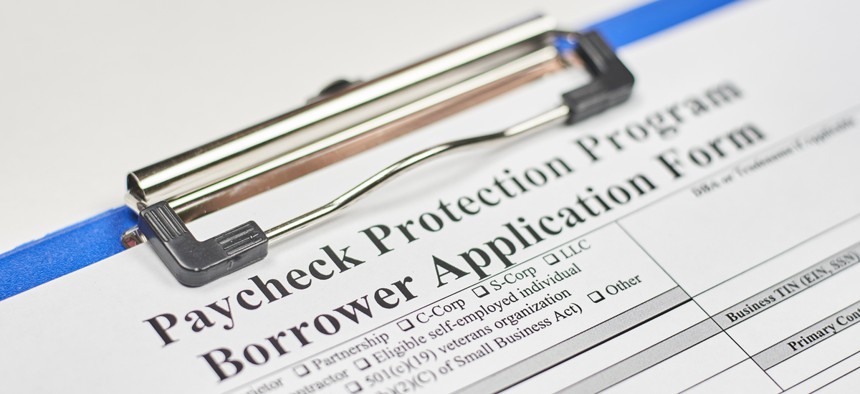Court Strikes Down Restrictions on Pandemic Aid for Small Business Owners with Criminal Records

The rules regarding which types of criminal records would disqualify a business owner changed several times. Shutterstock

Connecting state and local government leaders
The Small Business Administration has changed the rules following a lawsuit from small business owners with criminal records.
A federal court on Monday determined that Small Business Administration rules preventing business owners with criminal records from accessing funds in the Paycheck Protection Program were unlawful.
Small business owners who were banned from taking part in the Paycheck Protection Program, a federal initiative meant to keep employees on payrolls during the coronavirus pandemic, sued the SBA over the restrictions in mid-June. Lawyers from the ACLU and the Public Interest Law Center representing several small business owners with criminal records said that the rules were discriminatory and arbitrary.
The lawsuit argued that the SBA acted unlawfully in adding the criminal records restrictions when such rules were not spelled out by Congress in the CARES Act, which provided funding for the PPP. The SBA took “Congress’s straightforward mandate to administer the PPP to sustain small businesses—and the workers they employ—and added unnecessary, confusing, inconsistent, unexplained, and shifting exclusions of small-business owners who have had contact with the criminal-legal system,” the lawsuit said.
The rules regarding which types of criminal records would disqualify a business owner changed several times, leading to confusion about eligibility and preventing some people from completing the application. In an interview with Route Fifty in mid-June, Claudia De Palma, a staff attorney for the Public Interest Law Center, said that the changes “were hard even for a team of lawyers to sort through, let alone business owners.”
On June 24, in response to the lawsuit, the SBA changed their interim rules to allow a broader group of business owners to apply, including those with pending misdemeanor charges and those on probation or parole for older crimes. Business owners with pending felony charges and those serving probation or parole for felony crimes in the past year, as well as those convicted of financial crimes in the past five years, are still barred.
Lawyers for the small business owners then asked for an extension of the PPP deadline from June 30 to July 21 for business owners who had previously been ineligible but were now able to apply under the new interim rule. “Intervention from this court is the only way to give those whom [the SBA] has wrongfully excluded from relief—as well as the banks that stopped accepting applications solely because of the impending deadline—an interval even remotely close to the three-month window Congress promised all eligible applicants,” the lawyers wrote.
The federal court ruled on the injunction on Monday, stating that the restrictions in place before the June 24 rule change were unlawful and arbitrary and granting an application extension to the plaintiffs in the case, as well as the plaintiffs in a related case, until July 21. The court did not extend the application deadline for anyone other than the named plaintiffs.
“The court notes that the late revision of the rule on June 24, 2020, has put the plaintiffs in a difficult situation and based on the record before the court, is likely to cause the individual plaintiffs irreparable harm since they may not be able to obtain PPP funding,” Judge Catherine C. Blake wrote in her decision.
In a statement, ReNika Moore, the director of the ACLU’s Racial Justice Program said that the “ruling rightly calls the SBA's previously broad exclusions of business owners with criminal records unlawful.”
De Palma, with the Public Interest Law Center, said that the decision is a good step for the plaintiffs in the case but fails others in similar circumstances. “Thousands of businesses owned by people with criminal histories were illegally blocked from receiving aid through the PPP program, and Black and Latinx communities faced the deepest impact of this restriction,” she said in a statement. “The SBA must not repeat this injustice in any future aid programs, and we hope that the clear message sent by today’s ruling will insure that they won’t.”
The SBA did not return a request for comment.
The Senate on Tuesday passed legislation that would extend the application deadline for all business owners interested in the PPP to August 8. U.S. Sen. Ben Cardin, the top Democrat on the Small Business Committee, urged his fellow lawmakers to extend the deadline so that more business owners can access the approximately $130 billion left in the program. "The resources are there," he said. "The need is there. We just need to change the date."
The legislation now heads to the U.S. House. If it passes that chamber and is signed into law by President Trump, the June 24 rule change would apply to any new applications.
Emma Coleman is the assistant editor for Route Fifty.

NEXT STORY: How North Carolina Transformed Itself Into the Worst State to Be Unemployed





